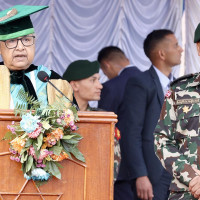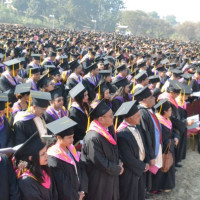- Sunday, 28 December 2025
The Teacher: Beyond Intelligence
 Sushant Kumar B.K.
Sushant Kumar B.K.
"Mero ta Moj cha Yaar," (My life is all
joy, dude) – my friend Ramesh replied when I asked him about his well-being
over the phone. Ramesh and I had been intimate friends since childhood, growing
up in the same countryside, studying together at the local college. Ramesh was
always the top student; his intelligence was far superior to that of his peers,
a fact reflected in his academic results as well.
After earning his bachelor's degree, he
headed to Kathmandu to pursue further education and continued to shine in his
academic journey. He excelled at the top of his master's degree program at a
prestigious university. His academic achievements were the talk of our village,
and we all celebrated his success.
However,
during the conversation, Ramesh revealed another side of his life. "During
the day, I teach at three different private colleges as a part-time English
teacher in Kathmandu," he admitted. "But mostly on Fridays, I spend
time with some
students
at bars. They pay for everything since they belong to rich families."
I
couldn't help but feel a pang of disappointment. Somewhere deep down, those
words compelled me to question the ethics of his professional life, as they
seemed to reflect a lack of wisdom and character despite his engaging classes,
knowledge, and the success of his students under his guidance.
Some
philosophers argue that wisdom is a broader term than intelligence. Wisdom
includes ethical values and actions, and those who possess wisdom can
distinguish between wrong and right. However, despite being a teacher who is
supposed to be full of wisdom, Ramesh’s choice to visit bars and drink with
students made me feel that he lacks such qualities. During our conversation, he
also mentioned that he does not feel the positive burden of duties and
responsibilities, as he is a part-time teacher and most of his fellow teachers
are unfamiliar with him. "Who comes and goes doesn’t matter. No one knows
except the person who hired you," he said.
Ramesh is a clear illustration of the
moral deficiencies prevalent among some teachers today. It is truly
disheartening to realize that they undermine the integrity of the educational
system.
The
conversation made me ponder what makes a good teacher. Is intelligence the only
criterion for being a good teacher? What about wisdom and character? What is
the right process for selecting teachers? Do educational institutions train
teachers to be honest and moral? How can they motivate teachers to be
duty-bound and self-disciplined?
In recent years, with the rise of
science and technology, teachers have become more resourceful and knowledgeable
than ever. However, it is crucial for them to also embody wisdom and good
character. The role of a teacher is not only to impart academic knowledge but
also to serve as a role model for students. The impact of a teacher on a
student's life spreads beyond the classroom; Teachers’ values, ethics, overall
personality, and character absolutely influence students.
Therefore, the following considerations
should be made during the selection process and after the selection of
teachers.
Selection
of Teachers
When selecting teachers, the education
institutions should initiate a mechanism to evaluate candidates' ethical
values, in addition to their excellent academic qualifications. The mechanism
could include thorough background checks, psychological well-being assessments,
and interviews focusing on ethical issues. By doing so, schools can ensure they
are hiring teachers who are not only knowledgeable but also capable of serving
as positive role models for their students.
Teachers’ Trainings beyond Curriculum
and Methodology
Educational institutions often focus
teacher training solely on curriculum, syllabus, and teaching methodologies.
However, training should encompass more than these aspects. It should also
cover ethics, self-discipline, and teachers' roles and responsibilities.
The
cushioning role of the principal
The principal should create an
environment where teachers feel that the institution is their second home by
bridging the communication gap among staff members. Rewarding good behavior can
motivate teachers to strive for excellence in all aspects of their roles.
Additionally, the principal should make teachers feel like the school's true
foundation by recognizing them as valuable employees. Fostering a sense of permanence
and belonging will encourage teachers to dedicate both their hearts and minds
to the organization. This can be achieved through regular meetings,
team-building activities, and, if needed, one-on-one positive counseling.
In a nutshell, the role of a teacher
goes beyond imparting academic knowledge. Teachers should serve as role models
embodying wisdom, good character, and ethical values. Therefore, educational
institutions should prioritize selecting teachers who possess these qualities
and provide professional as well as ethical training to help them grow in all
aspects of their profession. Thus, schools can ensure that teachers are highly
motivated, duty-bound, and self-disciplined. This, in turn, will have a
positive impact on pupils. Over time, students will grow into individuals with
strong moral values and ethical standards.
[Sushant
Kumar B.K.
is a Nepali poet, translator, educator, and freelance writer from Gulariya,
Bardiya, Nepal. He holds two degrees: an MA in English Literature and Political
Science. He primarily writes poems in English and Nepali. His poems have been
featured in national and international anthologies, magazines, newspapers, and
online portals. He can be reached at sushantacademia@gmail.com.".]

















